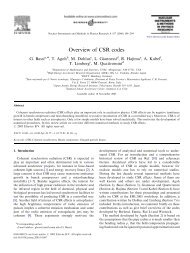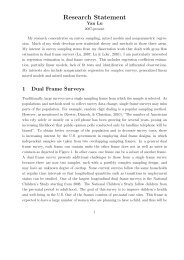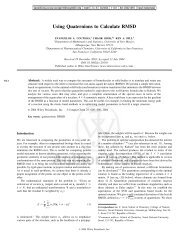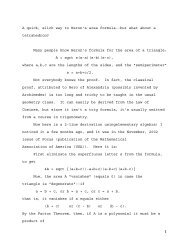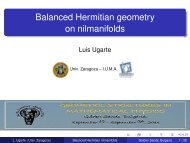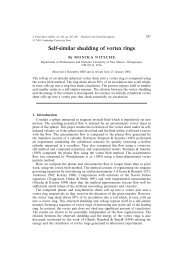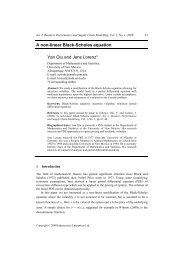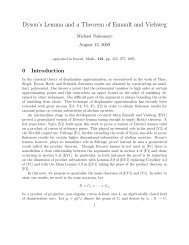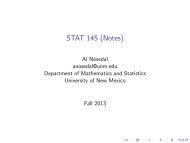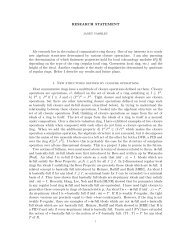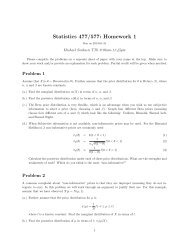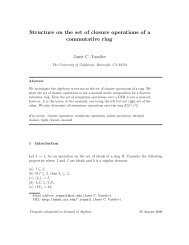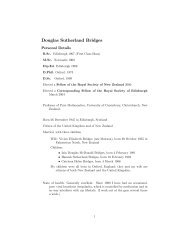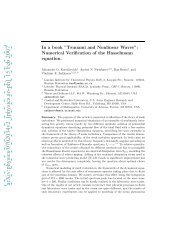OEO Office of Equal Opportunity - Department of Mathematics and ...
OEO Office of Equal Opportunity - Department of Mathematics and ...
OEO Office of Equal Opportunity - Department of Mathematics and ...
You also want an ePaper? Increase the reach of your titles
YUMPU automatically turns print PDFs into web optimized ePapers that Google loves.
LATIN AMERICAN STUDIES 233<br />
pursuing this emphasis generally take HIST 687. This course<br />
may be substituted upon approval from the Director <strong>of</strong> Latin<br />
American Studies.<br />
Human Rights Concentration.<br />
ANTH 539, ECON 423*, HIST 574, 575, 653, LAW 505, 537,<br />
541, 548, 593, 667.<br />
International Management Concentration.<br />
511, 524, 574, 583, 594, 595, 597.<br />
Political Science Concentration.<br />
POLS 511, 512, 520, 521, 540, 541.<br />
Religion & Philosophy Concentration.<br />
ANTH 533, HIST 656, PHIL 588, 589, PHIL 590, SOC 422,<br />
SOC 532.<br />
Sociology Concentration.<br />
SOC 461*, 484*, 503, 506, 508, 509, 513, 520, 528, 584.<br />
Spanish American Literature Concentration.<br />
SPAN 430**, 431**, 432**, 433**, 435**, 438*, 439**, 502,<br />
504, 531, 532, 536, 631, 633, 639.<br />
Spanish Linguistics Concentration.<br />
SPAN 443**, 540, 542, 543, 545, 546, 547, 548, 549.<br />
Students with limited background in Spanish Linguistics are<br />
encouraged to take SPAN 350 <strong>and</strong> 352.<br />
Variations may occur from year to year in the availability <strong>of</strong><br />
faculty members to support concentrations. Such changes<br />
in faculty availability are beyond the control <strong>of</strong> the Latin<br />
American Studies program. Thus, it may occasionally be<br />
impossible for students to obtain sufficient coursework <strong>and</strong><br />
advisement in one or more concentrations described herein.<br />
Therefore students’ choices <strong>of</strong> concentrations require the<br />
prior approval <strong>of</strong> the Director <strong>of</strong> Latin American Studies.<br />
Ph.D. in Latin American Studies<br />
Students select a primary <strong>and</strong> secondary concentration.<br />
Primary concentrations include: Anthropology, Art History,<br />
Brazilian Literature & Culture, History, Political Science,<br />
Sociology, Spanish American Literature, <strong>and</strong> Spanish<br />
Linguistics. Secondary concentrations include: Anthropology,<br />
Art History, Brazilian Literature & Culture, Economics, History,<br />
International Management, Political Science, Sociology,<br />
Spanish American Literature, <strong>and</strong> Spanish Linguistics.<br />
Concentration requirements.<br />
Select from the following list <strong>of</strong> courses for each concentration.<br />
Substitutions for these courses will be considered on a<br />
case-by-case basis.<br />
Anthropology: ANTH 522, 524, 529, 532, 537, 539, 543, 546,<br />
547, 561, 562, 565, 566, 567, 574, 584, 587. Art History:<br />
ARTH 500, 511, 512, 529, 549, 550, 560, 580, 583, 585,<br />
588, 589, 590, 593, 594. Brazilian Literature & Culture:<br />
PORT 461*, 514, 515, 516, 517, 521, 557, 558, 570, SPAN<br />
502. History: HIST 518, 560, 570, 571, 572, 573, 574, 575,<br />
576, 577, 628, 643, 644, 645, 648, 649, 650, 651, 652, 653,<br />
654, 655, 656, 665, 673, 685, 686, 687, 688, 689, 690,<br />
692. Political Science: POLS 511, 512, 520, 521, 525, 540,<br />
541, 580, 581, 582, 583, 681. Sociology: SOC 420*, 461*,<br />
484*, 503, 506, 508, 509, 510, 513, 520, 528, 584. Spanish<br />
American Literature: SPAN 430**, 431**, 432, 433**, 435**,<br />
438**, 439**, 502, 504, 531, 532, 536, 601, 631, 633, 639.<br />
Spanish Linguistics: SPAN 443**, 540, 541, 542, 543, 545,<br />
546, 547, 548, 549, 550. Economics: ECON 410*, 421, 423,<br />
424*, 427*, 429*, 442*, 503, 520, 521, 542, 584. International<br />
Management: MGT 511, 524, 574, 583, 594, 595, 597.<br />
M.A. in Latin American Studies<br />
Applications: In addition to the materials required by the<br />
University <strong>of</strong> New Mexico <strong>Office</strong> <strong>of</strong> Graduate Studies, the following<br />
items must be submitted directly to the Latin American<br />
Studies Program: three letters <strong>of</strong> recommendation, a letter<br />
<strong>of</strong> intent, an academic writing sample, un<strong>of</strong>ficial copies <strong>of</strong><br />
transcripts, <strong>and</strong> GRE scores.<br />
Prerequisites: The Bachelor’s degree is required.<br />
Background work in the social sciences <strong>and</strong> humanities<br />
related to Latin America is recommended. At least two years<br />
<strong>of</strong> undergraduate course work (or equivalent language<br />
training) in either Spanish or Portuguese is required prior to<br />
admission. Applicants with otherwise strong qualifications<br />
but with limited Spanish competence may be admitted on<br />
the condition that they complete Spanish 352, Advanced<br />
Grammar, within their first year <strong>of</strong> graduate study.<br />
Degree Requirements<br />
Plan I (thesis option); 36 credit hours. Students must select<br />
two areas <strong>of</strong> concentration within the MALAS program.<br />
Students have the option <strong>of</strong> completing 9 credit hours in one<br />
concentration <strong>and</strong> 15 credit hours in the other concentration<br />
or completing 12 credit hours in each concentration. The<br />
remaining 12 credit hours are divided between 6 hours <strong>of</strong><br />
program electives <strong>and</strong> 6 hours <strong>of</strong> thesis credits.<br />
Students under the Plan I option must complete a minimum<br />
<strong>of</strong> 12 credits in graduate seminars numbered 500 or above<br />
(excluding 551 or 552 Problems courses) <strong>and</strong> 6 hours <strong>of</strong> thesis<br />
credits numbered 599. Students should consult with the<br />
Academic Advisor to determine which courses are considered<br />
seminars. Students are required to present an oral defense <strong>of</strong><br />
the thesis before a thesis committee composed <strong>of</strong> at least two<br />
faculty members in one area <strong>of</strong> concentration <strong>and</strong> one faculty<br />
member from the second area <strong>of</strong> concentration.Students also<br />
are required to sit for the comprehensive examination in the<br />
second area <strong>of</strong> concentration, administered by three faculty<br />
members from that concentration.<br />
Plan II (non-thesis option); 36 credit hours. Students must<br />
select two areas <strong>of</strong> concentration within the MALAS program.<br />
Students have the option <strong>of</strong> completing 9 credit hours in one<br />
concentration <strong>and</strong> 15 credit hours in the other concentration<br />
or completing 12 credit hours in each concentration.<br />
The remaining 12 credit hours are comprised <strong>of</strong> electives.<br />
Students are required to sit for the comprehensive examinations<br />
in both areas <strong>of</strong> concentration. The examinations are<br />
administered by a Committee on Studies composed <strong>of</strong> two<br />
faculty members from each concentration.<br />
Under the Plan II option, students must complete a minimum<br />
<strong>of</strong> 12 credits in graduate seminars numbered 500 or above<br />
(excluding 551 or 552 Problems courses). Students should<br />
consult with the Academic Advisor to determine which<br />
courses are considered seminars.<br />
To maintain <strong>and</strong> improve language pr<strong>of</strong>iciency during graduate<br />
studies, students under both Plan I <strong>and</strong> II who are not<br />
concentrating in Brazilian Literature & Culture, Spanish<br />
American Literature, or Spanish Linguistics will be required<br />
to take an upper division language course: Spanish 307 or<br />
above; Portuguese 311 or above; or a course in one <strong>of</strong> Latin<br />
America’s indigenous languages. If the course is available<br />
for graduate credit, it can count as one <strong>of</strong> the student’s elective<br />
courses.<br />
Dual degrees: The Interdisciplinary Committee on Latin<br />
American Studies coordinates the five dual degree programs<br />
noted below. The student applying to any dual degree program<br />
is required to meet entrance <strong>and</strong> other requirements<br />
<strong>of</strong> both programs.<br />
Students wishing to add one <strong>of</strong> these dual degree options<br />
after their initial enrollment must apply to that program within<br />
three semesters. Acceptance into the second program will<br />
establish dual degree status for the student.<br />
MALAS/MBA: Offered jointly with the Robert O. Anderson<br />
Schools <strong>of</strong> Management (ASM), this program is designed<br />
to train management pr<strong>of</strong>essionals with special expertise<br />
in Latin America. The dual degree reduces requirements to<br />
complete the two degrees by approximately 12 hours, to a<br />
ARTS AND<br />
SCIENCES<br />
UNM CATALOG 2006–2007 Symbols, page 611.



